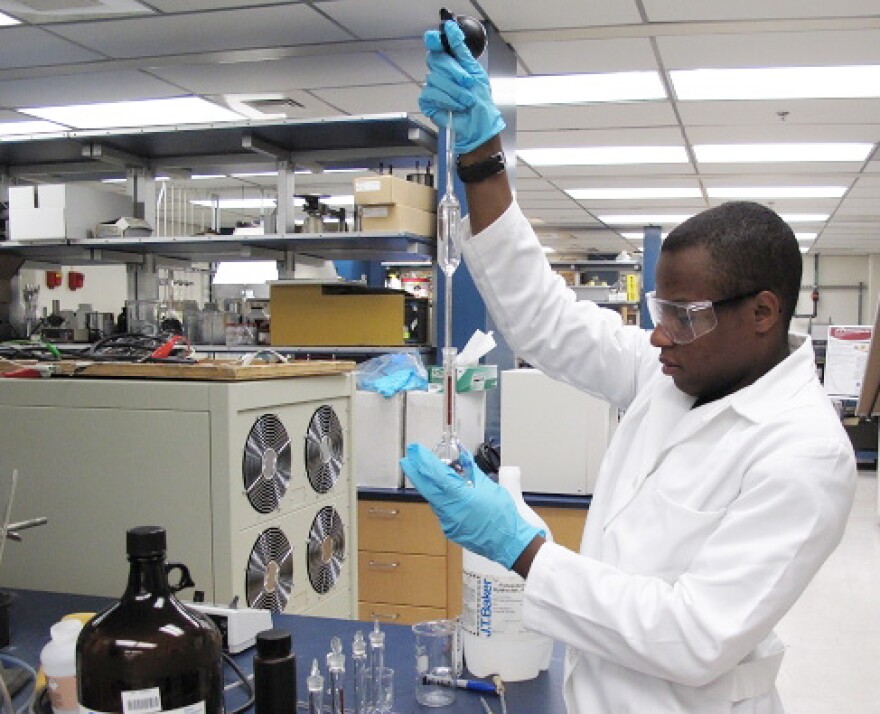Based on the heated rhetoric in the North Carolina governor's race, the State Crime Lab is either a broken, corrupt lab that prevents justice, or it's an efficient operation that puts thousands of killers and rapists behind bars. The lab is part of the office of Attorney General Roy Cooper, a Democrat now running for governor.
“Cooper's failure to fix problems at the State Crime Lab may have impacted the state's ability to administer justice,” says a narrator in an ad the Republican Governors Association put out. The association and Governor Pat McCrory have both tried to make the lab part of the campaign.
“Roy Cooper didn’t do his job,” the ad concludes.
Cooper has been North Carolina Attorney General since 2001. The job is essentially chief legal officer: prosecuting cases, defending state laws and reaching settlements.
It also includes oversight of the State Crime Lab, which is actually three labs in Raleigh, Asheville and Greensboro.
“I'm Roy Cooper, and you deserve the truth about the crime lab,” the attorney general says in an ad his campaign is airing. In it, he says that there was a massive backlog of DNA test kits when he took office, and that he cleared it.
“We also solved over 2,000 crimes and put killers and rapists in prison from cold cases,” he says. “We fixed the problems at the crime lab.”
There's fact and fiction in all of the ads. The crime lab has helped solve nearly 3,000 cold cases, according to state data. And Cooper did inherit a backlog of DNA kits when he took office. The lab director says that was cleared by 2007.
But there's a wide range in how long cases take today. Noelle Talley is a spokeswoman for the attorney general's office.
"Cases can be worked by the crime lab in as little as week when there's a rush request form law enforcement," she says. "The current average turnaround time for all cases is approximately 6.8 months."
Talley says a DUI case with one blood vial can be done quickly, while a murder case with up to 150 pieces of evidence takes much longer.
Charlotte-Mecklenburg police say that's true for their lab, too. CMPD started its own lab in 1969, and several nearby cities use it as well. On average, it is faster than the state lab. A CMPD spokesman says even the department’s most complex cases are usually done in three to six months.
There's no national standard for how long all this should take, says Jean Stover, executive director of the American Society of Crime Laboratory Directors.
"It's hard to put a number on turnaround times," she says. "Of course, it varies between the various disciplines."
Stover's professional background is with the crime lab system in Illinois. The longest delay she can remember was six months, which is quicker than the average case in North Carolina right now.
But Stover says the Illinois system included eight crime labs, while North Carolina only has three.
"Most of the time in those cases, it is a huge staffing issue," she says. "Do we have enough people to handle the influx of casework that is coming in on daily basis?"
The North Carolina legislature sets the funding for the crime lab. Noelle Talley says the attorney general's office has been requesting more staff to keep up with state growth.
"In recent years, the funding that’s been allocated has fallen several million dollars short of what we've requested," she says.
State lawmakers have added positions - just not as many as the lab's leaders say they need.
The result is either great or terrible based on which sheriffs you listen to in other campaign ads on this topic. Several county sheriffs who are trying to stay out of the political fight say delays have varied during Cooper's tenure. But they say the lab has improved over the past three to four years.
"There has been a concerted effort to make changes, and I think those changes are helping," Union County Sheriff Eddie Cathey says. "No question, we've still got a backlog. But those changes are helping."
Neither Cathey nor the other sheriffs we talked to outside of the campaign fight referenced any kind of negligence or misconduct at the crime lab, which are claims the Republican ads make.
A series by the Raleigh News & Observer in 2010 raised questions about some lab employees withholding evidence. Cooper asked a former FBI assistant director to lead an outside review, and that review uncovered some shoddy blood work but no deliberate suppression of evidence. Most of it happened before Cooper took office.
However, it is fair to say the delays at the crime lab have impacted how North Carolina administers justice. Sheriff Cathey says for people charged with crimes, "The longer it takes, the longer they sit in jail or the longer they're out on bond waiting for trial."
In other cases, law enforcement is delayed from bringing charges in the first place, meaning a guilty person could stay on the street longer.
Of course, that's not unique to the North Carolina Crime Lab. It just tends to have longer delays than some others. Cathey says there can be legitimate reasons for those, with funding as perhaps the biggest.
He and everyone else in law enforcement we spoke to agree on one thing: they're frustrated with how political this issue has become.

